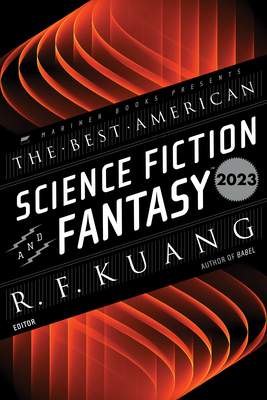 The Best American Science Fiction and Fantasy 2023 by R.F. Kuang, John Joseph Adams
The Best American Science Fiction and Fantasy 2023 by R.F. Kuang, John Joseph Adams Format: eARC
Source: publisher
Formats available: paperback, ebook, audiobook
Genres: anthologies, fantasy, science fiction, short stories
Series: The Best American Science Fiction and Fantasy
Pages: 320
Published by Mariner Books on October 17, 2023
Purchasing Info: Author's Website, Publisher's Website, Amazon, Barnes & Noble, Kobo, Bookshop.org, Better World Books
Goodreads
“Short stories have to accomplish a nearly impossible magic trick: to introduce a world often much stranger than our own and make you care about it in a matter of pages,” writes R. F. Kuang in her introduction. “The most important part of this magic trick is just a willingness to get weird.” The stories in The Best American Science Fiction and Fantasy 2023 are brimming with bizarre and otherworldly premises. Women can’t lie or fall in love. Fathers feed their children ghost preserves. Souls chase one another through animal incarnations. Yet these stories are grounded deeply in our reality. Out of these stories’ weirdness emerges the cruelty of border enforcement, the horror of legislation restricting reproductive freedom, the frightening pace of AI. The result is a stunning, immersive, intensely felt experience, showing us less of what the world is, and more of what it could be.
The Best American Science Fiction and Fantasy 2023 includes Nathan Ballingrud • KT Bryski • Isabel Cañas • Maria Dong • Kim Fu • Theodora Goss • Alix E. Harrow • S. L. Huang • Stephen Graham Jones • Shingai Njeri Kagunda • Isabel J. Kim • Samantha Mills • MKRNYILGLD • Malka Older • Susan Palwick • Linda Raquel Nieves Pérez • Sofia Samatar • Kristina Ten • Catherynne M. Valente • Chris Willrich
My Review:
This collection begins with a kind of a story getting into a bit of the nitty-gritty of just how this collection of stories was assembled. After all, it’s a fairly big ask and an equally large task to distill one year’s ENTIRE SF/F short fiction output into a book that has to be, if not all things to all (SF/F) people, at least serve as a representative sampling of the best works of an entire year in a genre that ranges from the dark heart of a monstrous villain’s soul – if they have one – to the furthest reaches of the stars – and covers everywhere and everywhen in between.
Not all stories will work for all readers, something that is especially true in such an encompassing genre, one filled with niches that may or may not even all occupy the same literary planet.
All of that being said, this collection is guaranteed to have its delightful moments for any reader of science fiction, fantasy, or any of the times, places and spaces in between.
For sheer reading pleasure, my favorites in this year’s collection were fantasy or at least fantasy-ish. Notice I said for reading pleasure, as other stories in the collection in other niches hit different places in my reading brain.
The story I loved most and hardest is, far and away, Alix E. Harrow’s “The Six Deaths of the Saint”. A story that reads like fantasy even though in the end it has SFnal elements. I loved this one because it’s a story about myths and mythmaking, but it’s told through the perspective of the person being made into a myth who finally breaks free of the legend that has accreted around them. That it happens with the aid of a love so great it makes Westley in The Princess Bride seem like he’s not even trying just adds to both the glory and the heartbreak of the story.
While Alix Harrow’s story blew me away, there were two other stories, just a bit lighter in tone, that I also adored.
“Pellargonia: A Letter to the Journal of Imaginary Anthropology” by Theodora Goss sits on the border between fantasy and SF, and I’m still not sure where it falls. This is fun because it begins as an exercise in imagination that becomes real, at least for situations where The Velveteen Rabbit is an imaginary country instead of a child’s toy. A group of high school students create an imaginary country, send scholarly papers to scholarly journals about the imaginary country, add Wikipedia pages about the imaginary country they’ve created – and it starts turning up in the news, the real news, and suddenly everyone remembers Pellargonia as if it’s always been there. The story is about the kids confessing what they’ve done, as though they can put the Pellargonia genie back in it’s magical bottle after it’s already become the center of a possible war.
The last of my fun favorites is “Cumulative Ethical Guidelines for Mid-Range Interstellar Storytellers” by Malka Older which is, at least in setting, actual science fiction. But it reads as if it’s in the same voice as the author’s wonderful SF/steampunk/mystery series, The Investigations of Mossa and Pleiti, with its tones of otherworldly academia where the politics and the strictures are still awfully vicious because the stakes are awfully small. It’s a story about what should be done instead of getting it done, and it’s just a lot of fun.
As much fun as those three stories were, there’s a second set of stories that captured me because they speak to the present moment in ways that chilled me to the bone. Because everything seems to come in threes, there are three stories in this category, at least for this reader, as well.
“Rabbit Test” by Samantha Mills and “The CRISPR Cookbook” by MKRNYILGLD read as responses to the overturning of Roe v. Wade in that they extend the loss of bodily autonomy represented by that decision and slide it down the slippery slope as far and as frighteningly as possible into the ramifications of that loss and the many future restrictions it might lead to.
Last, but equally not least, and also in response to the current events surrounding AI being taught to take the place of humans and human interactions, “Murder by Pixel” by S.L. Huang takes a deep dive into just how toxic and downright disgusting AI chatbots can become – and just how humans made them that way.
Escape Rating A-: It’s always difficult to rate collections like this one, because reading mileage varies widely, one person’s meat is another’s poison, etc., etc., etc. Howsomever, there was only one story in this collection that I bounced off hard, and that’s rare for me. Usually there are several. And I loved “The Six Deaths of the Saint” really, really hard, and a whole bunch of the other stories I either really enjoyed or really stuck with me, so I’m rounding this one up to an A- for all of those reasons.
To make a long story short – as is this collection’s whole, entire purpose – if you don’t generally read SF/F in the short form (it’s not usually my jam) but want to get a picture of what happened last year, this collection is a great place to read!

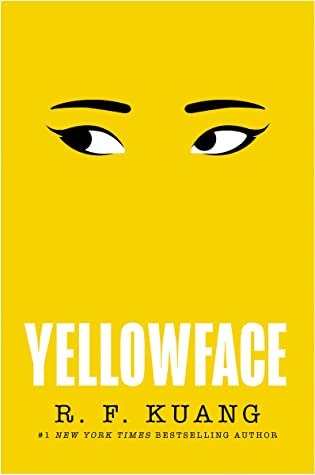 Yellowface by
Yellowface by 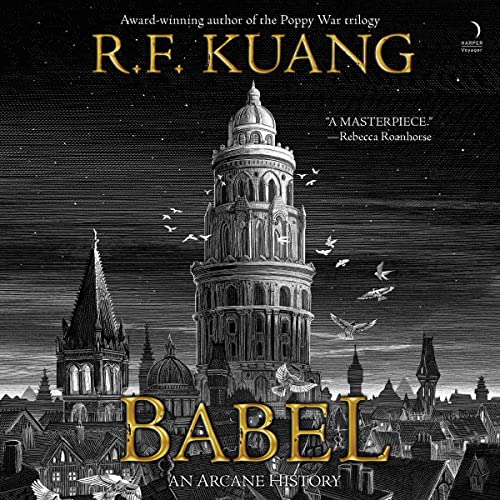 Babel, Or the Necessity of Violence: An Arcane History of the Oxford Translators' Revolution by
Babel, Or the Necessity of Violence: An Arcane History of the Oxford Translators' Revolution by 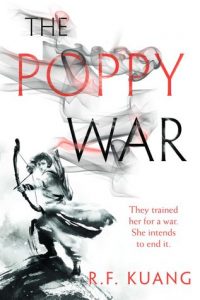 In a work of historical fantasy, particularly one that cleaved so close to this period, those evils would be impossible to ignore and no reader should expect them to be ignored. But Babel is fiction, which means I also went into it expecting a story to be told that would captivate me – and in this particular case captivate me every bit as much as the author’s
In a work of historical fantasy, particularly one that cleaved so close to this period, those evils would be impossible to ignore and no reader should expect them to be ignored. But Babel is fiction, which means I also went into it expecting a story to be told that would captivate me – and in this particular case captivate me every bit as much as the author’s 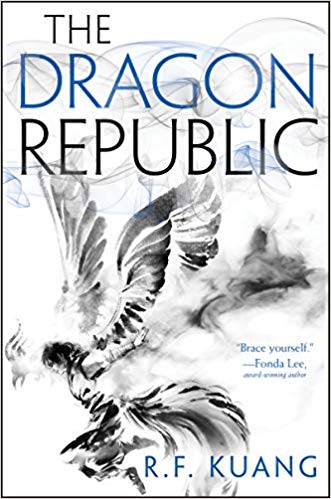 The Dragon Republic (The Poppy War, #2) by
The Dragon Republic (The Poppy War, #2) by 
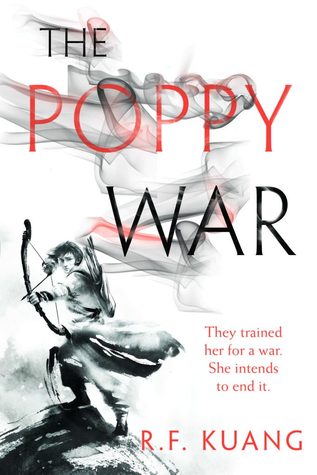 The Poppy War by
The Poppy War by